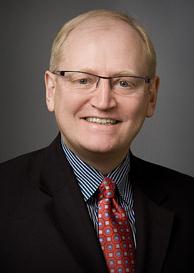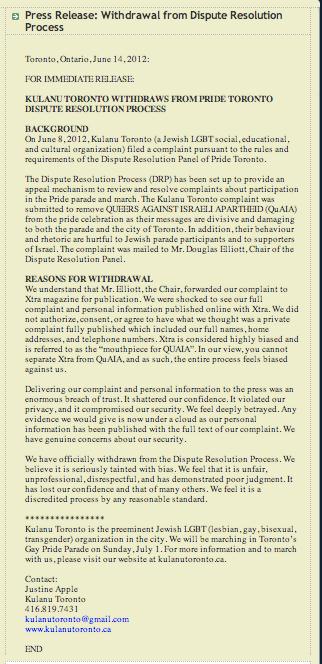
On June 12 Justine Apple recommended the Xtra story containing the complaint to her Facebook friends. Two days later, she released a statement criticizing Xtra. Credit: Kulanu

Lawyer Doug Elliott. Credit: Courtesy photo

Kulanu's Justine Apple. Credit: Andrea Houston (file photo)

Kulanu's original press release. Credit: Andrea Houston (file photo)

New York-based filmmaker, writer and historian Sarah Schulman. Credit: Courtesy photo
Kulanu Toronto has withdrawn its complaint against the participation of Queers Against Israeli Apartheid (QuAIA) in the Pride parade because Kulanu’s executive director says the integrity of Pride Toronto’s dispute resolution process was compromised when Xtra published her original complaint.
In a press release dated June 14, Justine Apple says she was under the impression the dispute resolution process is “private.” Kulanu is a Toronto organization for gay and lesbian Jewish people. Apple says the group was “shocked” to see the full complaint and contact information posted on xtra.ca.
“Xtra is considered highly biased and is referred to as the ‘mouthpiece for QUAIA.’ In our view, you cannot separate Xtra from QuAIA, and as such, the entire process feels biased against us,” she stated in the release.
However, on June 12 Apple had recommended the same Xtra story, containing the complaint, on Facebook, writing “Please read this important article.”
The press release was removed from Kulanu’s website on June 15 and replaced with a second version that does not accuse Xtra of tampering with a legal process. In the second version, Apple maintains that the dispute committee tainted the process by releasing the document in the first place. “[It was] an enormous breach of trust. It shattered our confidence. It violated our privacy, and it compromised our security. We feel deeply betrayed.”
Apple says Pride Toronto did not make it clear the dispute resolution process would be public. “We feel that real transparency means the dispute resolution committee should have contacted us first before releasing information to the media.”
Apple contacted Xtra on June 13 and asked that the document be removed, including her contact information. Xtra declined to remove the document but blocked out the contact information.
Apple tells Xtra that after she took time to think about her original comments regarding Xtra, she decided to remove them. The revised press release was sent to other members of the media with instructions to disregard the first statement.
“We were pretty emotional yesterday based on everything that was going on,” she says. “After sleeping on it, we realized that had to be removed. This is about how we feel about the dispute resolution process. We went into it with the best intentions, and we felt that our trust was compromised.”
Lawyer Doug Elliott, who is leading the dispute resolution process, says it’s “false” to claim that releasing the document violates privacy. He says he had been clear that the respondent — in this case QuAIA — of any complaint would be alerted if a complaint has been filed.
After Elliott received the complaint from Kulanu on June 8, he says, he sent it to QuAIA immediately, as he is required to do. “The complaint is no longer private once it is filed to the dispute resolution process because it has to be sent to the respondent.
“For her to have an expectation that the information contained in the complaint would be kept private is really beyond my comprehension. It stems from a fundamental misunderstanding of the way the process works,” he says.
Likewise, he adds, it is a standard requirement to include contact information in any legal process, saying that there was nothing requiring Apple to include her personal phone number or address or even her real name. “They could have filed it through a lawyer.
“I’m not sure where they got the impression this would be some sort of anonymous complaint process. Once they sent it to me, it became a public document. QuAIA could have sent it to anyone they liked. They could have plastered it on billboards up and down Church St if they want,” he says.
“The insinuation that I leaked it to Xtra in preference to other media is really completely unfounded,” Elliott says. “If [Toronto Sun columnist] Sue-Ann Levy had of asked me, she would have got the same response.”
Elliott says there have been two other complaints filed against QuAIA’s participation in the Pride parade, and he will likely use the same panel that was assembled for Kulanu’s complaint.
Apple says Kulanu is not affiliated with the other complaints.
“Despite everything that has gone on, we’re looking forward to having a celebratory Pride,” she says. “Our goal is to bring back the inclusivity that we feel has been lost at Pride.”
Filmmaker, writer and historian Sarah Schulman, who is based in New York City and has written extensively on this issue, says Kulanu is attempting to speak for the Jewish community. “I read the Kulanu complaint. They are using the word ‘Jew’ falsely. What they really mean is people who support certain Israeli policies . . . Kulanu uses the word ‘Jew’ in a political sense, not an ethnic or religious sense.”
By trying to silence QuAIA, groups like Kulanu are distracting people from, and essentially condoning, real human rights abuses, Schulman says. “There is an important and vital Palestinian queer movement. Those people are living under separate rules, one for Jews and one for Palestinians. They have been clear that they need the system to change.”
Canadians must look beyond their borders, she says. “These are queer people living in an apartheid situation, and they are asking us to support them in fighting it.
“We live in a global community. If other queer people are telling us what’s happening to them, we have a responsibility to at least allow that voice to be heard,” she says.
QuAIA isn’t alone in its criticism, she says. “Internationally, queer people are talking about occupation. The leaders of our movement are very involved in it. Judith Butler, who is the most important queer theorist in the world, has taken a very strong stance in recognizing that the separate system in Israel is apartheid.
“This is a mainstream conversation inside the global queer community,” she says. “So for Toronto Pride to forbid this is absurd and goes against the trend.”
Schulman says the dispute resolution panel should not have the power to decide whether or not a political issue is discussed at Pride. “If you are accountable to the community, you have open events in which everyone is invited to express their point of view. That is how we functioned for 30 years.”
The larger issue is that Pride Toronto is shackled to its funding; PT should move to hosting an open Pride, free of any government interference, she says. “Let the funding go. It’s not going to kill Pride; it will give it a new vitality.”
“We’re in a moral quandary. Are we so psychologically dependent on government funding that we’re willing to do whatever we’re told? Or have we come to a point when we say we’re not going to take funding anymore and host different kind of events? You don’t need funding. You can have gay pride for nothing. There were many years we had it for free.”

 Why you can trust Xtra
Why you can trust Xtra


